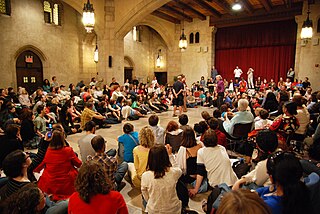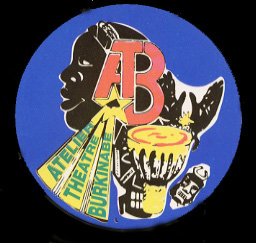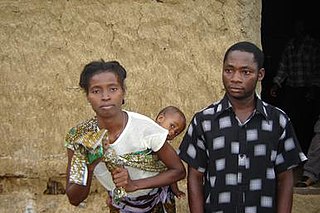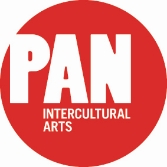
Augusto Boal was a Brazilian theatre practitioner, drama theorist, and political activist. He was the founder of Theatre of the Oppressed, a theatrical form originally used in radical left popular education movements. Boal served one term as a Vereador in Rio de Janeiro from 1993 to 1997, where he developed legislative theatre.
Community theatre refers to any theatrical performance made in relation to particular communities—its usage includes theatre made by, with, and for a community. It may refer to a production that is made entirely by a community with no outside help, or a collaboration between community members and professional theatre artists, or a performance made entirely by professionals that is addressed to a particular community. Community theatres range in size from small groups led by single individuals that perform in borrowed spaces to large permanent companies with well-equipped facilities of their own. Many community theatres are successful, non-profit businesses with a large active membership and, often, a full-time staff. Community theatre is often devised and may draw on popular theatrical forms, such as carnival, circus, and parades, as well as performance modes from commercial theatre. This type of theatre is ever-changing and evolving due to the influences of the community; the artistic process can often be heavily affected by the community's socioeconomic circumstances.
Invisible theatre is a form of theatrical performance that is enacted in a place where people would not normally expect to see one, for example in the street or in a shopping centre. Performers disguise the fact that it is a performance from those who observe and who may choose to participate in it, thus leading spectators to view it as a real, unstaged event.

Experimental theatre, inspired largely by Wagner's concept of Gesamtkunstwerk, began in Western theatre in the late 19th century with Alfred Jarry and his Ubu plays as a rejection of both the age in particular and, in general, the dominant ways of writing and producing plays. The term has shifted over time as the mainstream theatre world has adopted many forms that were once considered radical.

Drama therapy is the use of theatre techniques to facilitate personal growth and promote mental health. Drama therapy is used in a wide variety of settings, including hospitals, schools, mental health centers, prisons, and businesses. Drama therapy, as a modality of the creative arts therapies, exists in many forms and can apply to individuals, couples, families, and various groups.
Applied drama is an umbrella term for the use of theatrical practices and creativity that takes participants and audience members further than mainstream theatre. It is often in response to conventional people with real life stories. The work often happens in non-conventional theatre spaces and social settings. There are several forms and practices considered to be under the umbrella of applied theatre.
Theatre for development (TfD) is a type of community-based or interactive theatre practice that aims to promote civic dialogue and engagement.
The theatre games tradition is a method of training actors that was developed in the 20th century by practitioners such as Joan Littlewood, Viola Spolin, Paul Sills, Clive Barker, Keith Johnstone, Jerzy Grotowski and Augusto Boal. Theatre games are also commonly used as warm-up exercises for actors before a rehearsal or performance, in the development of improvisational theatre, and as a lateral means to rehearse dramatic material. They are also used in drama therapy to overcome anxiety by simulating scenarios that would be fear-inducing in real life.

The Theatre of the Oppressed (TO) describes theatrical forms that the Brazilian theatre practitioner Augusto Boal first elaborated in the 1970s, initially in Brazil and later in Europe. Boal was influenced by the work of the educator and theorist Paulo Freire and his book Pedagogy of the Oppressed. Boal's techniques use theatre as means of promoting social and political change in alignment originally with radical-left politics and later with centre-left ideology. In the Theatre of the Oppressed, the audience becomes active, such that as "spect-actors" they explore, show, analyse and transform the reality in which they are living.
The Lehrstücke are a radical and experimental form of modernist theatre developed by Bertolt Brecht and his collaborators from the 1920s to the late 1930s. The Lehrstücke stem from Brecht's epic theatre techniques but as a core principle explore the possibilities of learning through acting, playing roles, adopting postures and attitudes etc. and hence no longer divide between actors and audience. Brecht himself translated the term as learning-play, emphasizing the aspect of learning through participation, whereas the German term could be understood as teaching-play. Reiner Steinweg goes so far as to suggest adopting a term coined by the Brazilian avant garde theatre director Zé Celso, Theatre of Discovery, as being even clearer.
A theatre practitioner is someone who creates theatrical performances and/or produces a theoretical discourse that informs their practical work. A theatre practitioner may be a director, dramatist, actor, designer or a combination of these traditionally separate roles. Theatre practice describes the collective work that various theatre practitioners do.
Interactive theatre is a presentational or theatrical form or work that breaks the "fourth wall" that traditionally separates the performer from the audience both physically and verbally.

The Atelier-Théâtre Burkinabé (ATB) is a Burkinabé theatre group which practises "theatre for development".
Theatre pedagogy is an independent discipline combining both theatre and pedagogy. As a field that arose during the 20th century, theatre pedagogy has developed separately from drama education, the distinction being that the drama teacher typically teaches method, theory and/or practice of performance alone, while theatre pedagogy integrates both art and education to develop language and strengthen social awareness. Theatre pedagogy is rooted in drama and stagecraft, yet works to educate people outside the realm of theatre itself.

O Meu Marido Está a Negar is a 2007 documentary film about a play of the same name, written and directed by Rogério Manjate. The film and play both discuss HIV/AIDS issues. Manjate directed the award-winning short I Love You, also concerning HIV/AIDS, the same year. The film's title means "My Husband is in Denial".
David Diamond is a founding member of the Vancouver based theatre company Theatre for Living. He is the originator of Theatre for Living techniques. He was Artistic Director of the theatre company from 1984 until 2018 when, with the support of the board of directors and Staff he decided to 'devolve' the organization. Diamond continues to offer Theatre for Living workshop processes on many issues with communities who invite him to do so and also offers training workshops in Theatre for Living techniques. He is also a keynote speaker, author and actor.
Experimental theatre in the Arab world emerged in the post-colonial era as a fusion of Western theatrical traditions with local performance cultures such as music and dance. It is characterized by hybridity as it transposes Arabic traditional performances that were usually seen in public squares and marketplaces to theatre buildings. Experimental theatre in the Arab world has historically taken forms of Forum theatre by using audience participation as a way to smooth conflicts and resolve social tension. The audience is then transformed from a commonly passive into a proactive and involved one. It has been seen as a form of theatre of resistance and cultural activism as it deals with contemporary sensitive issues of the region such as the Israeli–Palestinian conflict, the Arab Spring, the role of women in Arabic society and religion. Such issues are often dealt with using humour. Throughout the years, experimental theatre in the Arab world has gradually converted into a synonymous of non-mainstream and underground art movements in which artists are always evolving and breaking down conventional markers between actors and spectators. The script combines the appropriation and dis-appropriation of Western models and is usually organic, more improvisational and self-reflexive. In the late 2000s, improvisational theatre which takes forms of stand-up comedy shows has also emerged around the Arab world.
Image theatre is a performance technique in which one person, acting as a sculptor, moulds one or more people acting as statues, using only touch and resisting the use of words or mirror-image modelling. The images presented in this form of theatre are a series of still-images or tableauxs that are dynamised via a variety of ways. They could have repetitive sounds and mechanical-like movements designed into them for example, or they could be dynamised by transitioning from one image to the other in a before-during-after style format. The images can be directly clear to the viewer or abstract. The sculptor can also be a statue, and thus mould themselves, or the statues themselves can be invited to sculpt their own ideas and perspectives into the image.

Pan is an intercultural arts organization and registered charity based in London, UK, that uses the arts to explore cultural diversity and social change. The main purpose of the organization is to help marginalised young people from all cultures and religions who are at risk of social exclusion to improve personal and interpersonal skills through a range of arts activities including drama, music, film, dance, creative writing and visual arts.
Immersive theater differentiates itself from traditional theater by removing the stage and immersing audiences within the performance itself. Often, this is accomplished by using a specific location (site-specific), allowing audiences to converse with the actors and interact with their surroundings (interactive), thereby breaking the fourth wall.







